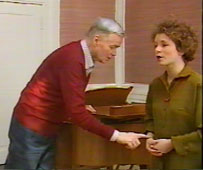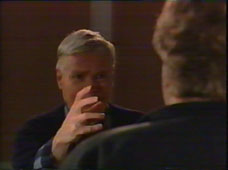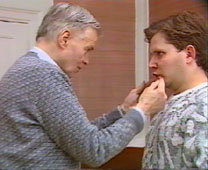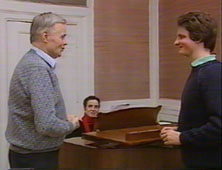|
|
|
|
|
|
| Dietrich Fischer-Dieskau has held a professorship at the Hochschule der Künste in Berlin since 1983. There he teaches song interpretation to classes of singers and pianists. In addition, he gives master classes in many cities in Germany and in other countries, some of which are open to the public. By this time, many young singers have received the benefit of his advice and teaching, either in a brief master class or over a more extended period of time. Among those former pupils who have established successful careers are Andreas Schmidt, Matthias Goerne, Christine Schäfer, Dietrich Henschel, Stella Doufexis, Christian Elsner, and Stephan Genz. And many other successful young singers who have not studied with him acknowledge him as a major influence, such as Thomas Quasthoff, Bo Skovhus, and Ian Bostridge. And finally, he has been a mentor to a number of instrumentalists, such as the pianist Imogen Cooper and the cellist Pieter Wispelwey. |
|
|
|
|
'In my opinion meager praise is what makes a good teacher. Of course the bearer of the vox humana, which is deeply connected to the psyche, wants to be treated with the utmost care and concern. But no ambitious student should be satisfied to be showered with rose water. Those who want to say something instructive must make a judgment call each time between praise and criticism, for which there is no set formula.' (Dietrich Fischer-Dieskau, Reverberations). 
"You come to his home," Goerne relates, "and
bring your own pianist with you. The lesson takes place in a
long room, and he sits at the far end, really at the same distance
that someone in the audience would be in a recital hall. You
would come already very thoroughly prepared with a piece. One
interesting thing is that, unlike most teachers, he insists on
treating songs in their entirety, starting with the piano introduction."  'Many pupils study his recordings so intensively that they instinctively take an approach to singing that is very similar to Mr. Fischer-Dieskau's. But he doesn't demand that of singers when he teaches-- On the contrary, he encourages everyone to seek his own path. On just one occasion I tried to sing a song the way he would have sung it. He didn't let me sing three measures before he pointed out to me that every singer has to shape his way of singing according to the unique qualities of his own voice.' (Christian Elsner, interviewed in S. Näher, Das Schubert-Lied und seine Interpreten).  [Responding to the question, what's the greatest voice you ever heard?] "Fischer-Dieskau! I first heard him sing when my German teacher put on his recording of 'Erlkönig.' I fell in love with the voice, and the words engaged me-- even though I didn't quite understand them yet. (It was my first lesson.) In his heyday, in the 50's and early 60's, the mezza voce was especially beautiful. And the intelligence behind the voice-- it's always telling you something. It's sort of strange that he's not rated as a 'voice,' because even in opera he has a really special approach to roles, even Italian ones-- particularly Iago. But critics only compare him to sterotypes of what sort of voice sings these roles, rather than [appreciating] his fresh approach. He was a very 'hungry' artist, wanting to do so many things. The 50's and 60's were the peak time for projects like the complete Schubert lieder, and for making the definitive version of things. Singing along with his recordings as a tenor, I would dig in in the wrong key. But it was great for my German. I am primarily a lieder singer, and I wouldn't be a singer if it weren't for him." (Ian Bostridge, Opera News). '"As a young lieder singer you can't get around Fischer-Dieskau," the Danish baritone Boje Skovhus told me. "German isn't my native language, and I have learned so much about the language listening to him, which he understands profoundly. Anybody can sort-of sing German-- listen to all the Wagner singers. But if you sing a note as long as it's written, it's wrong. You have to sing it as if it were spoken. I'd rather hear a singer 'speaking' than 'singing,' if you know what I mean. That's how you really communicate with an audience. And that's a lesson we have all learned from Fischer-Dieskau."' (Bo Skovhus, quoted in Opera News). |

|
'A casual conversation following a performance of Die Schöne
Müllerin (with Christoph Eschenbach) in which [Imogen]Cooper
admitted to her growing passion with Schumann's music, led to
her playing for the great singer: Fischer-Dieskau: "I hope you play the Humoreske." Cooper: "I'm obsessed with it." Fischer-Dieskau: "So am I. And nobody ever plays it." Cooper: "I'll play it to you." Fischer-Dieskau: "Very good idea. Come to Berlin in September." Fischer-Dieskau summoned, and although it took Cooper another year to get the Humoreske under her belt (she'd made all her decisions about how she'd approach the piece during a flight to Aberdeen!), to Berlin she went. Fischer-Dieskau's piano, she tells, wasn't the best. "My old box," he used to call it. "But when you think of the people who'd played on it," she recalls, "and the music-making that had gone on in that room, it was awe-inspiring. What I retained from him was the feeling that Schumann was absolutely under the skin of this man. All sides of Schumann, particularly the mad side. I mean, there were some passages that, I now see, I played cheekily; and he said: "No, no. It's wide-eyed." He was walking around the room, humming it. He didn't actually sing, unfortunately, which was what I was longing for him to do! Things like that. Just slightly modifying the feeling of things here and there. Once in a while, he'd say to me: "Ah! You play that phrase like an old singer!" I said: "So?" He had a very good sense of humor. He was absolutely undogmatic. Also, as Cooper was to discover, Fischer-Dieskau was particularly adept at pointing down those lapses in her playing that had passed her by. "He stopped me at one point, and said: "You've played this passage three times now. Have you realised there's a little wrong note in the bass?" I was playing a C instead of a B flat at that moment. In the speed of what was going on, I hadn't really taken that mistake on board. He asked me; "Why is that happening?" The question makes total sense when things go wrong in performance, or when you're practicing. It's a case of practicing in your mistakes because you're thinking of something ostensibly more important. What you should be thinking is, "Am I doing a daft fingering there? Is there something illogical?", to which the answer is nearly always "Yes". Then you should look at the passage again. Needless to say, playing to Fischer-Dieskau was a nerve-wracking experience. If Cooper didn't play her best-- "At the end I said to him: "This has not been the easiest experience." He said: "No, no. I would feel the same. It's very difficult to play for somebody."-- Fischer-Dieskau didn't seem to mind. What he was interested in was the work that could be done on the piece."' (Imogen Cooper, from an article in Soundscapes). |
| contents | homepage |
herausgegeben von: © Monika Wolf, 1999-2021

translations and compilations: © Celia A. Sgroi, January 2004
